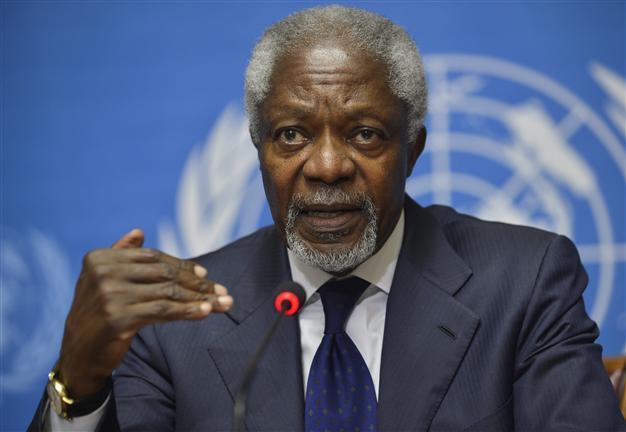Peace envoy Annan quits as Syria violence rages
NEAR ALEPPO, Syria - Agence France-Presse

AP Photo
International envoy Kofi Annan is stepping down, UN chief Ban Ki-moon announced today "with deep regret," his April peace plan for Syria in tatters in the face of raging violence. Rebels shelled an air base used by regime forces to pound the northern city of Aleppo, as a human rights group reported that the bodies of 43 people had been recovered after a security force raid near Damascus.The UN chief paid tribute to Annan for his efforts in the "most difficult" assignment of ending the bloodshed that human rights monitors say has claimed more than 20,000 lives in Syria since an uprising against President Bashar al-Assad's rule erupted in March last year.
But he said the former UN chief would now step down at the end of the month and the search had begun for a successor.
"I wish to express my deepest gratitude to Mr Annan for the determined and courageous efforts he has made as the Joint Special Envoy for Syria," Ban said.
"Kofi Annan deserves our profound admiration for the selfless way in which he has put his formidable skills and prestige to this most difficult and potentially thankless of assignments," he added.
The UN and Arab League named Annan as its envoy on the Syria conflict on February 23 and he brokered a six-point peace plan that was supposed to begin with a ceasefire from April 12.
But the truce never took hold and the United Nations has begun winding down an observer mission that was supposed to oversee it ahead of the expiry of its mandate later this month.
Ban's announcement came as rebel forces shelled the Menagh air base, 30 kilometres (18 miles) northwest of Aleppo, as the battle for Syria's commercial capital intensified.
An AFP reporter who witnessed the bombardment said the rebels told him it was "an attack to take this airport being used by helicopters and planes that are firing on Aleppo." The Britain-based Syrian Observatory for Human Rights said a tank the rebels had captured from the army was used in the morning shelling.
It is difficult to get an overall picture of the situation inside Aleppo itself because of a lack of independent sources and restrictions on journalists.
Mobile phone and Internet services, cut since Wednesday night, were being gradually restored in Aleppo by Thursday afternoon.
Thursday's air base assault came after US President Barack Obama was reported to have signed a covert document authorising US support for the rebels.
The directive was contained in a "finding" -- a device authorising clandestine action by the Central Intelligence Agency, NBC and CNN said, citing unidentified sources.
White House officials declined to comment, but did not specifically rule out the idea that Washington was providing more intelligence support to anti-Assad forces than had previously been made public.
US Defence Secretary Leon Panetta was in Jordan on Thursday for talks on Syria with King Abdullah II.
"They agreed that strong international pressure needs to be sustained to make it clear that Assad must go, and that the Syrian people deserve to determine their own future," Pentagon spokesman George Little told reporters.
The Observatory said a security forces raid southwest of Damascus killed 43 people, some of whom were tortured and executed.
"Regime forces entered the Jdaidet Artuz district on Wednesday and arrested around 100 young people who were taken to a school and tortured," it said.
"On Thursday morning after the operation the bodies of 43 people were recovered. Some of them had been summarily executed." A resident of neighbouring Artuz said the army had shelled the village from Jdaidet Artuz.
"There's nobody. Not one shop is open; the houses have been deserted by their inhabitants fearing violence -- everyone has fled," the resident said.
Nationwide, at least 51 people were killed on Thursday -- 30 civilians, 11 soldiers and 10 rebels, said the Observatory, which has estimated that more than 20,000 people have died since mid-March last year.
'Everyone has fled'
Russian President Vladimir Putin and British premier David Cameron failed to hide their differences on the Syrian crisis before the two leaders watched the Olympic judo together on Putin's first visit to Britain for seven years.
After 45 minutes of talks at his Downing Street residence, Cameron acknowledged: "There have been some differences in the positions that we've taken over the Syrian conflict." Britain has strongly criticised Russia's repeated blocking of any threat of UN sanctions against the Assad regime. Moscow has accused Western governments of bias towards the rebels.
On Friday, the UN General Assembly will vote on a largely symbolic Arab-drafted resolution calling on Assad to stand down.
Three million of Syria's 22 million people need food, crops and livestock assistance, the UN's Food and Agriculture Organisation said, citing a survey by the United Nations and the Syrian government.
The FAO said figure included 1.5 million Syrians who "need urgent and immediate food assistance over the next three to six months, especially in areas that have seen the greatest conflict and population displacement."
















